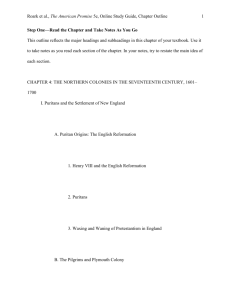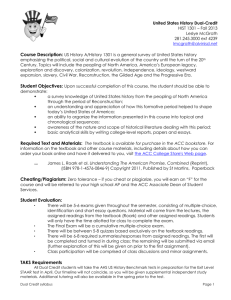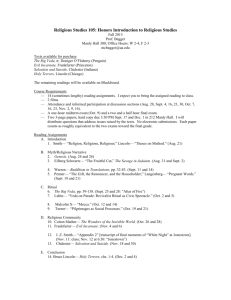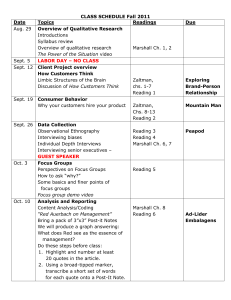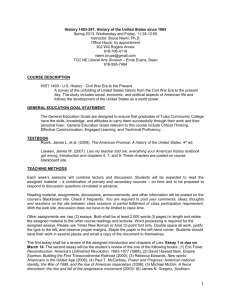17575
advertisement
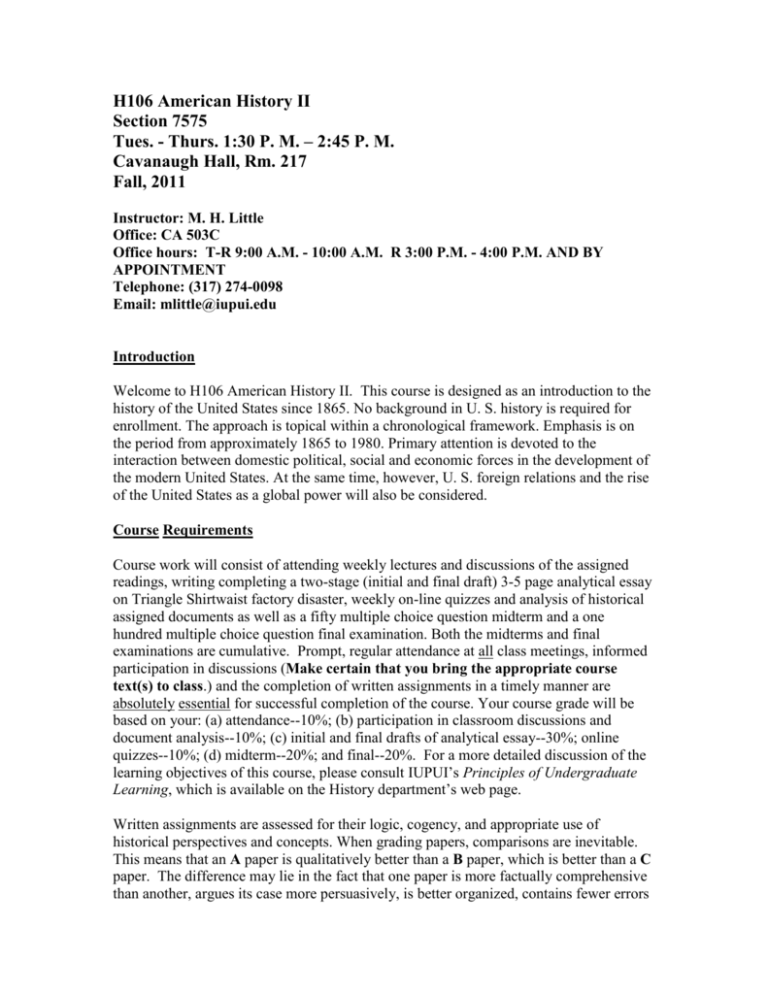
H106 American History II Section 7575 Tues. - Thurs. 1:30 P. M. – 2:45 P. M. Cavanaugh Hall, Rm. 217 Fall, 2011 Instructor: M. H. Little Office: CA 503C Office hours: T-R 9:00 A.M. - 10:00 A.M. R 3:00 P.M. - 4:00 P.M. AND BY APPOINTMENT Telephone: (317) 274-0098 Email: mlittle@iupui.edu Introduction Welcome to H106 American History II. This course is designed as an introduction to the history of the United States since 1865. No background in U. S. history is required for enrollment. The approach is topical within a chronological framework. Emphasis is on the period from approximately 1865 to 1980. Primary attention is devoted to the interaction between domestic political, social and economic forces in the development of the modern United States. At the same time, however, U. S. foreign relations and the rise of the United States as a global power will also be considered. Course Requirements Course work will consist of attending weekly lectures and discussions of the assigned readings, writing completing a two-stage (initial and final draft) 3-5 page analytical essay on Triangle Shirtwaist factory disaster, weekly on-line quizzes and analysis of historical assigned documents as well as a fifty multiple choice question midterm and a one hundred multiple choice question final examination. Both the midterms and final examinations are cumulative. Prompt, regular attendance at all class meetings, informed participation in discussions (Make certain that you bring the appropriate course text(s) to class.) and the completion of written assignments in a timely manner are absolutely essential for successful completion of the course. Your course grade will be based on your: (a) attendance--10%; (b) participation in classroom discussions and document analysis--10%; (c) initial and final drafts of analytical essay--30%; online quizzes--10%; (d) midterm--20%; and final--20%. For a more detailed discussion of the learning objectives of this course, please consult IUPUI’s Principles of Undergraduate Learning, which is available on the History department’s web page. Written assignments are assessed for their logic, cogency, and appropriate use of historical perspectives and concepts. When grading papers, comparisons are inevitable. This means that an A paper is qualitatively better than a B paper, which is better than a C paper. The difference may lie in the fact that one paper is more factually comprehensive than another, argues its case more persuasively, is better organized, contains fewer errors 2 of grammar, spelling and punctuation, or is simply a more literate, polished piece of work. In assessing oral contributions during weekly in-class discussion of course material, I will listen for thoughtful, insightful remarks that occur on a regular basis, that demonstrate a mastery of the subject matter and display a capacity for effective synthesis and analysis. The following is the grade scale used in the course: A+ 98, A 93, A- 90, B+ 88, B 83, B- 80, C+ 78, C 73, C- 70, D+ 68, D 63, D- 60. New Drop Limit Policy for Freshmen University College freshmen (25 hours or below) may not drop more than one course per semester. This policy will be enforced through advisor sign-off on drop requests. The policy does not include course adjustments made during the first week of class nor does it apply to classes in which a student has been "administratively withdrawn." Administrative Withdrawal A basic requirement of this course is that you will participate in class and conscientiously complete writing and reading assignments. Please contact me if you are unable to attend class or complete an assignment on time. If you miss more than half our class meetings within the first four weeks of the semester without contacting me, you will be administratively withdrawn from this section. Our class meets twice per week. Thus, if you miss more than four* classes in the first four weeks, you may be withdrawn. Administrative withdrawal may have serious academic, financial aid and/or student scholarship implications. Administrative withdrawal will take place after the full refund period, and if you are administratively withdrawn from the course you will not be eligible for a tuition refund. If you have questions about the administrative withdrawal policy at any point during the semester, please contact me. Academic Misconduct It must be noted that any form of academic misconduct by a student in the course will not be tolerated. This includes obvious types of academic misconduct such as cheating on examinations and/or plagiarism as well as submitting the same paper for credit in different courses. Any student who is found guilty of such misconduct by the instructor will receive an F on that assignment as well as the course and have his/her infraction recorded as a permanent part of his/her academic record. For a more detailed explanation of the different types of academic misconduct, please consult "Attendance, Policies and General Course Requirements" for this course and the IUPUI Code of Student Rights, Responsibilities and Conduct handbook. 3 Course Texts The following books are required reading for the course. They are available for purchase at the IUI bookstore. Items marked with an * are available as downloadable materials on Oncourse. James L. Roark, et al. The American Promise: A History of the United States. Vol. II 4th Edition Michael P. Johnson, Reading the American Past: Selected Historical Documents. Vol. II 4th Edition Jo Ann Argersinger, The Triangle Fire: A Brief History with Documents. First Edition Gerald Graff and Cathy Birkenstein, "They Say / I Say" The Moves That Matter in Academic Writing. 2nd Edition Daily Schedule and Assignments Organizational Meeting Discussion of course purpose, assignments and goals History as a Way of Thought and Action Read: Course syllabus Read: Graff, Birkenstein and Durst, pp. 1-14 Students are required to develop and ask at least two questions about the course after a careful reading of the course syllabus. Aug. 23 Aug. 25 Reconstruction in the United States Aug. 30 Podcast: Eric Foner, “The Significance of Reconstruction in American History” Read: Roark, Chapter 16 Reconstruction in the United States Read: Johnson, Chapter 16 Read: Graff, Birkenstein and Durst, pp. 19-28, 30-40 Sept. 1 The Social and Economic Transformation of the U. S. Sept. 6 Lecture: The Closing of the Frontier and Modern U. S. Business Read: Roark, Chapters 17 & 18 The Social and Economic Transformation of the U. S. Read: Johnson, Chapters 17 & 18 Read, Graff, Birkenstein and Durst, pp. 30-51, 68-77 Sept. 8 Growth and Social Change in Urban-Industrial America Sept. 13 Lecture: Migration, Immigration and the Urban-Industrial Metropolis Read: Roark, Chapter 19 4 Growth and Social Change in Urban-Industrial America Read: Johnson, Chapter 19 First draft of essay of Argersinger, The Triangle Fire due Sept. 15 The “Gilded Age” and the “Splendid Little War” Lecture: The Populist Movement and the Spanish American War Read: Roark, Chapter 20 Sept. 20 The “Gilded Age” and the “Splendid Little War” Read: Johnson, Chapter 20 Sept. 22 Post-Civil War Society, Politics and Reform Lecture: Progressivism Read: Roark, Chapter 21 Sept. 27 Post-Civil War Society, Politics and Reform Read: Johnson, Chapter 21 Final draft of essay of Argersinger, The Triangle Fire due Sept. 29 Review for Midterm Examination Oct. 4 Comprehensive In-Class Midterm Examination Oct. 6 Includes Roark, Chapters 16 thru 21; Johnson, Chapters 16 thru 21, and in-class lectures/presentations The United States and the “Great War” Lecture: The United States and World War I Read: Roark, Chapter 22 Oct. 11 The United States and the “Great War” Read: Johnson, Chapter 22 Oct. 13 Fall Break – No Class Oct. 18 The 1920s in the United States Lecture: The 1920s and the Birth of Modern American Culture Read: Roark, Chapter 23; Johnson, Chapter 23 Oct. 20 The Great Depression and FDR’s New Deal Lecture: The Great Depression and FDR's New Deal Read: Roark, Chapter 24 Oct. 25 The Great Depression and FDR’s New Deal Read: Johnson, Chapter 24 Oct. 27 5 The United States and World War II Causes and Consequences of World War II Read: Roark, Chapter 25 Nov. 1 Lecture: The The United States and World War II Read: Johnson, Chapter 25 Nov. 3 Truman, Eisenhower and the Cold War United States Lecture: Truman, Eisenhower and the Cold War Read: Roark, Chapters 26 & 27 Nov. 8 Truman, Eisenhower and the Cold War United States Read: Johnson, Chapters 26 & 27. Nov. 10 Years of Social Protest, Reform and Reaction Civil Rights Movement and Post-WWII Reform Read: Roark, Chapter 28 Nov. 15 Lecture: The Years of Social Protest, Reform and Reaction Read: Johnson, Chapter 28 Nov. 17 Open date Nov. 22 Thanksgiving Holiday – No Class Nov. 24 The Vietnam War and the Limits of U. S. Power DVD: “Inside the Vietnam War” Read: Roark, Chapter 29 Nov. 29 The Vietnam War and the Limits of U. S. Power Johnson, Chapter 29 Dec. 1 The United States and Neo-Conservatism DVD: “American Experience: Nixon” Read: Roark, Chapter 30 Dec. 6 The United States and Neo-Conservatism Read: Johnson, Chapter 30 Dec. 8 Classes End Final Examination - Tuesday Time: 1:00 P. M. - 3:00 P. M. Location: CA 217 Last revised 8/20/11 Dec. 12 Dec. 13


